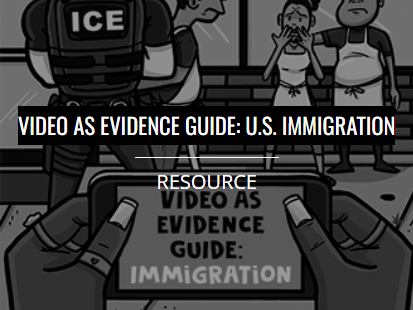Printable business signs are at the bottom of this page here.
Click here to see Hold Customs and Border Protection (CBP) Accountable updates
AIRR hotline to report ICE activity: (913) 999-2398

Video as Evidence Guide: U.S. Immigration
This in-depth guide is for both immigration attorneys and community members looking to utilize eyewitness video as evidence in legal cases. Video can be a powerful and visceral tool for defending the rights of individuals in immigration legal proceedings, but it’s not always clear how to use video for evidentiary purposes or how to film in a way that is most likely to support such proceedings. This Guide aims to help attorneys introduce video evidence that will pass legal muster in a removal hearing and support their clients, as well as help advocates and community members safely, ethically and effectively document encounters with immigration enforcement.
If You’re Stopped by Police
- You have the right to remain silent and do not have to discuss your immigration or citizenship status with police.
- Stay calm. Don’t run. Don’t tell others to run. Don’t argue, resist, or obstruct the police.
- Ask if you are free to leave. If yes, calmly and silently walk away.
Si Eres Parado por la Policía
- Tienes derecho a permanecer en silencio y no tienes que compartir tu estatus migratorio o ciudadanía con la policía.
- Mantén la calma. No corras. No le digas a otras personas que corran. No discutas, ni te resistas y no obstruyas a la policía.
- Pregunta si eres libre de irte. Si sí, en calma y en silencio retírate.
If You’re Stopped in Your Car
- Drivers and passengers have the right to remain silent. If you are a passenger, you can ask if you are free to leave. If the officer says yes, calmly leave.
- If an officer or immigration agent asks to look inside your car, you can refuse to consent to the search. But if police generally believe that your car contains evidence of a crime, your car can be searched without your consent.
Si Eres Parado En Tu Automóvil
- Los conductores y pasajeros tienen el derecho a permanecer en silencio. Si eres pasajero, puedes preguntar si eres libre de irte. Si el oficial dice que sí, retírate en calma.
- Si un oficial o agente de inmigración quiere revisar el interior de tu automóvil, puedes negarte a dar consentimiento a la inspección. Pero si la policía tiene una base razonable para creer (causa probable) que tu auto contiene evidencia de un crimen, pueden realizar una búsqueda sin tu consentimiento. Si eso ocurre, pregunta al oficial cuál es la causa probable para la inspección. (Y recuerda que tienes el derecho a grabar.)
If You’re Asked About Your Immigration Status
- You have the right to remain silent and do not have to discuss your immigration or citizenship status with police, immigration agents, or other officials. Anything you tell an officer can later be used against you in immigration court.
- If you are not a U.S. citizen and an immigration agent requests your immigration papers, you must show them if you have them with you.
- If an immigration agent asks if they can search you, you have the right to say no. Agents do not have the right to search you or your belongings without your consent or probable cause.
- If you’re over 18, carry your papers with you at all times. If you don’t have them, tell the officer that you want to remain silent, or that you want to consult a lawyer before answering any questions.
Si Se Te Pregunta Sobre Tu Estatus Migratorio
- Tienes derecho a permanecer en silencio y no tienes que hablar de tu situación migratoria o de ciudadanía con la policía, los agentes de inmigración u otros funcionarios. Todo lo que digas a un agente puede ser utilizado posteriormente en tu contra en un tribunal de inmigración.
- Si no eres ciudadano estadounidense y un agente de inmigración te pide tus documentos de inmigración, debes mostrárselos si los lleva contigo.
- Si un agente de inmigración te pregunta si puede revisarte, tienes derecho a negarte. Los agentes no tienen derecho a revisarte ni a ti ni a tus pertenencias sin tu consentimiento o sin causa probable.
- Si eres mayor de 18 años, lleva contigo tus documentos en todo momento. Si no los tienes, dile al oficial que deseas permanecer en silencio o que deseas consultar a un abogado antes de responder cualquier pregunta.
If Police or Immigration Agents Come to Your Home
- Stay calm and keep the door closed. Opening the door does not give them permission to come inside, but it is safer to speak to ICE through the door.
- You have the right to remain silent, even if officer has a warrant.
- You do not have to let police or immigration agents into your home unless they have certain kinds of warrants.
- If police have an arrest warrant, they are legally allowed to enter the home of the person on the warrant if they believe that person is inside. But a warrant of removal/deportation (Form I-205) does not allow officers to enter a home without consent.
- Ask if they are immigration agents and what they are there for.
- Ask the agent or officer to show you a badge or identification through the window or peephole.
- Ask if they have a warrant signed by a judge. If they say they do, ask them to slide it under the door or hold it up to a window so you can inspect it.
- Don’t lie or produce any false documents. Don’t sign anything without speaking with a lawyer first.
Si la Policía o Agentes de Inmigración Llegan a Tu Casa
- Permanece en calma y mantén la puerta cerrada. Abrir la puerta no les autoriza entrar, pero es más seguro hablar con ICE a través de la puerta.
- Tienes derecho a permanecer en silencio, aún si el oficial trae una orden. No tienes que permitir que la policía o los agentes de inmigración entren a tu casa a menos que haya una orden que claramente diga que tienen derecho a arrestarte o a revisar tu hogar.
- Si la policía tiene una orden de arresto, tienen permiso legal de entrar en el hogar de la persona nombrada en la orden si creen que esa persona está adentro. Pero una orden de remoción/deportación (Forma I-205) no permite a los oficiales entrar al hogar sin consentimiento.
- Pregunta si son agentes de inmigración y para qué han venido.
- Pregunta al agente u oficial que muestre su insignia/chapa o identificación a través de la ventana o mirilla.
- Pregunta si tienen una orden firmada por un juez. Si dicen que sí, pídeles que la deslicen por abajo de la puerta o que la maestro a través de una ventana para que la puedas inspeccionar.
- No mientas o saques ningún documento falso. No firmes nada sin hablar con un abogado primero.
If ICE is Present at a Public Location
- As of January 2025, ICE will no longer consider certain “sensitive” locations as off-limits for enforcement actions, such as schools, places of worship, healthcare facilities, and more.
- Although ICE can attempt enforcement in these locations, they still cannot access non-public areas unless 1) they have a judicial warrant signed by a judge (not just an administrative DHS/ICE order) or 2) someone who reasonably appears to have authority over the property gives ICE permission to enter. This also applies for access to school, employment, administrative, or other records.
- If you’re an individual, you can ask administrators or other people in charge of locations you frequent to clarify their policies, or you can educate them on their right to refuse compliance. If you’re a decision-maker such as a school administrator or workplace manager, you can make a policy that clearly states requirements for ICE to access the facilities.
Si ICE está Presente en una Ubicación Pública
- A partir de enero de 2025, ICE ya no considera algunas ubicaciones como “lugares sensibles” como sitios prohibidos para acciones de aplicación de la ley, tales como las escuelas, los centros religiosos, los centros de salud, y más.
- Aunque ICE puede intentar aplicar la ley en estas ubicaciones, aún no pueden tener acceso a las áreas no-públicas a menos que 1) tengan una orden judicial firmada por un juez (no solo una orden administrativa de DHS/ICE) o 2) alguien que parezca tener autoridad sobre la propiedad dé permiso a ICE para entrar. Esto también aplica para el acceso a registros escolares, de empleo, administrativos, y otros.
- Si eres un individuo, puedes pedir a los administradores, u otras personas a cargo de las ubicaciones que frecuentas, que expliquen sus políticas, o puedes informarles de su derecho a negarse a cumplir. Si eres responsable de la toma de decisiones, como un administrador escolar o un gerente de un lugar de trabajo, puedes crear una política que establezca claramente los requisitos para que ICE acceda a las instalaciones.
If You’re Taken Into Immigration (or “ICE”) Custody
- Say you wish to remain silent and ask for a lawyer immediately. Don’t give any explanations or excuses. Don’t say anything, sign anything, or make any decisions without a lawyer.
- You have the right to contact your consulate or have an officer inform the consulate of your detention.
- Don’t discuss your immigration status with anyone but your lawyer. While you are in jail, an immigration agent may visit you. Do not answer questions or sign anything before talking to a lawyer. Read all papers fully. If you do not understand or cannot read the papers, tell the officer you need an interpreter.
Si Eres Llevado Bajo la Custodia de Inmigración (o “ICE”)
- Di que deseas permanecer en silencio y pide inmediatamente a un abogado. No des explicaciones o excusas. No digas nada, no firmes nada, no tomes decisiones sin un abogado.
- Tienes el derecho de contactar a tu consulado o pedir a un oficial que informe al consulado sobre tu detención.
- Recuerda tu número de inmigración (número “A”) y dáselo a tu familia. Esto ayudará a que tus familiares puedan localizarte.
- No hables de tu estatus migratorio con nadie más que tu abogado. Mientras estés en la cárcel, un agente migratorio puede presentarse a visitarte – no respondas preguntas ni firmes nada antes de hablar con un abogado, y lee todos los papeles cuidadosamente. Si no puedes comprender o leer los papeles, dile al oficial que necesitas un intérprete.
If You Believe Your Rights Were Violated
- Write down everything you remember, including officers’ badges and patrol car numbers, which agency the officers were from, and any other details. Get contact information for witnesses.
- If you’re injured, seek medical attention immediately and take photographs of your injuries.
- File a written complaint with the agency’s internal affairs division or civilian complaint board. In most cases, you can file a complaint anonymously if you wish.
Si Crees Que Tus Derechos Han Sido Violados
- Escribe todo lo que recuerdes, incluyendo las insignias/chapas de los oficiales y los números de las patrullas, de qué agencia son los oficiales, y cualquier otro detalle. Toma la información de contacto de los testigos.
- Si resultas herido, busca atención médica inmediatamente y toma fotos de tus heridas.
- Presenta una queja por escrito ante la división de asuntos internos de la agencia o la junta de quejas civiles. En la mayoría de los casos, puedes presentar una queja de forma anónima si así lo deseas.
Stay Informed
Sign up to be the first to hear about how to take action.
By completing this form, I agree to receive occasional emails per the terms of the ACLU’s privacy statement.
By completing this form, I agree to receive occasional emails per the terms of the ACLU’s privacy statement.


